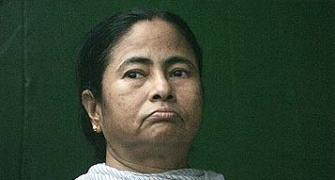 If the finance ministry finally allows the railways to expand its list of goods exempted from the service tax ambit, instead of a complete rollback to the 10 per cent service tax imposed on frieght movement, it could come as a reprieve for Railway Minister Mamata Banerjee.
If the finance ministry finally allows the railways to expand its list of goods exempted from the service tax ambit, instead of a complete rollback to the 10 per cent service tax imposed on frieght movement, it could come as a reprieve for Railway Minister Mamata Banerjee.
At present, the Ministry of Finance does not levy any service tax on the transportation of defence equipment, railway equipment, postal mail bags, luggage of train passengers, relief materials, foodgrain, petroleum products and specified essential commodities like salt, via railways.
"The railways might be allowed to include a few more items in this list, which would enable the railways to save some more money. We are looking at a middle path but no final decision has yet been taken," a senior finance ministry official told Business Standard.
In the Finance Bill 2010, a service tax of 10 per cent has been levied on 'service provided in relation to transport of goods by rail' with effect from April 1. In addition, there will be a two per cent education cess and one per cent higher education cess, taking the effective rate to 10.3 per cent.
Following the decision, Banerjee had expressed her unhappiness and had on several occasions requested Finance Minister Pranab Mukherjee for a waiver. On Thursday, she had publicly requested him to reconsider his decision so that her ministry could have enough money to build the 100 km of new railway tracks, among other things.
But the finance ministry had made it clear that this time no ministry would be able to avail of exemptions in perpetuity. According to sources, the move to allow expansion of the list of exempted goods could trigger similar waivers for other ministries. Civil Aviation Minister Praful Patel had also sought complete service tax waiver.
During 2009-10, the railway ministry had enjoyed a blanket exemption of service tax for more than eight months. Following the Union Budget, Banerjee had pegged her losses (if she paid full service tax) at Rs 6,000 crore (Rs 60 billion) for the next financial year.
However, finance ministry estimates put it at much less. "Taking into account freight earnings of Rs 62,489 crore (Rs 624.89 billion), as projected in the Railway Budget 2010-11, the service tax payable to the Centre by the railways works out to be Rs 1,000 crore (Rs 10 billion)," the official added.
The railway ministry, however, argued that the absorption of service tax would make allocations reserved for development purposes decline by a third in 2011-12.
The imposition of the service tax would have a direct impact on reducing by nearly 30 per cent the excess earning of Rs 3,173 crore (Rs 31.73 billion), projected to be registered by the railways in the coming financial year.
Initial estimates worked out by the ministry indicate that Banerjee's decision for a consession of Rs 100 per wagon for transportation of foodgrain and kerosene would cause the transporter a revenue loss of approximately Rs 2 crore (Rs 20 million) every month.









